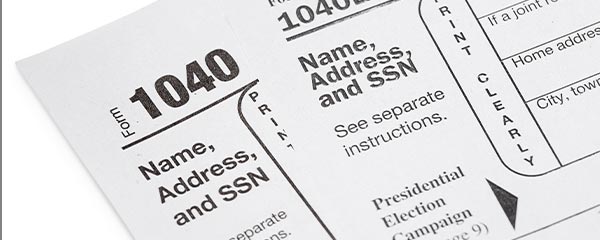PRINCETON, NJ -- As tax filing day looms, Americans fall into two closely matched camps: those who believe the amount they pay in federal income tax is too high (46%) and those who consider it "about right" (47%). Just 3% consider their taxes too low.
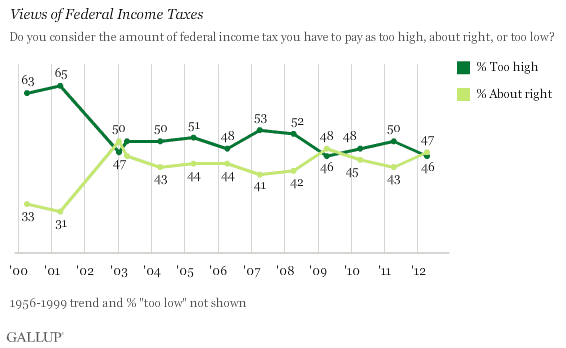
Separately, Gallup asks Americans to say whether they consider what they pay in income taxes to be fair, and, consistent with recent years, close to six in 10 call their taxes fair. Public acceptance of one's tax burden as fair also increased significantly after Bush's tax cuts took effect, peaking at 64% in 2003 just after the United States had launched the Iraq war.
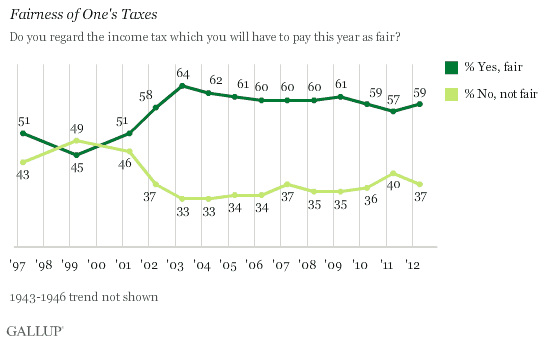
This year's findings come from Gallup's annual Economy and Personal Finance poll, conducted April 9-12.
Low-Income Adults Find Taxes Most Onerous, Least Fair
Low-income adults appear to be the least satisfied with what they pay in taxes, as 50% say their taxes are too high; 44% say they are about right or too low. By contrast, Americans earning $75,000 or more are almost evenly divided about their tax bill, and middle-income earners tilt toward being satisfied, with 54% saying their taxes are either about right or too low.
Gallup finds sharper differences by party ID, with the major distinction being between Democrats -- the majority of whom are satisfied with what they pay, or who think they should pay more -- and Republicans and independents, the slight majority of whom think their taxes are too high.
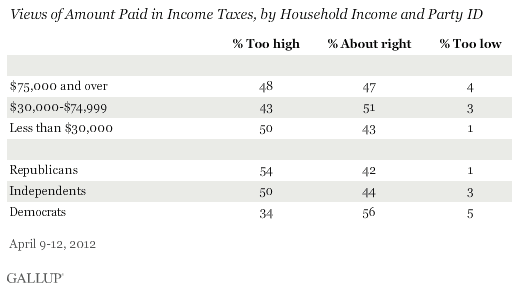
Lower-income Americans grew significantly more discontent with the amount they pay in taxes between 2009 and 2011, and maintain that higher level of unhappiness in this year's survey.
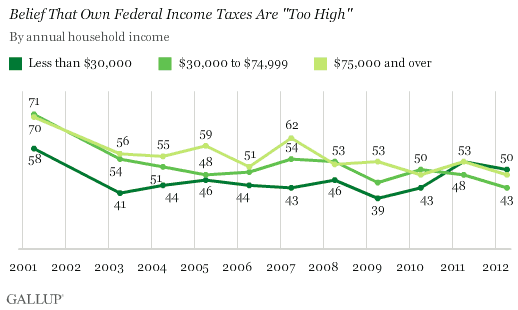
Similarly, since 2009, lower-income Americans have become increasingly likely to say their income taxes are "not fair," rising from 29% in April 2009 to 38% today.
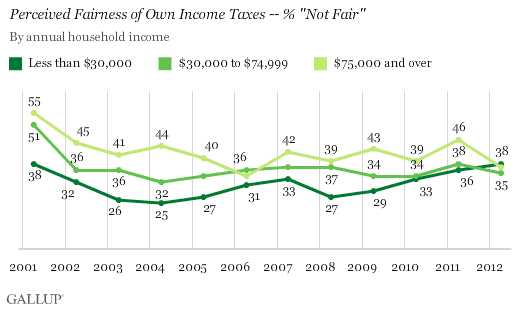
Bottom Line
Few Americans are eager to pay more in federal taxes, but the majority are at least content that what they pay is fair, and close to half consider their tax obligation about right. Less than half express more negative views, including 37% who say the amount they pay is unfair and 46% who say it is too high.
Perhaps because of the slow economy, or because of recent discussion of the "Buffett Rule" and President Barack Obama's related interest in shifting a greater proportion the nation's tax bill to high-income Americans, low-income Americans have grown increasingly discontent since 2009 with the amount and fairness of their own taxes. However, there has been no comparable shift in middle- and upper-income Americans' views.
Survey Methods
Results for this Gallup poll are based on telephone interviews conducted April 9-12, 2012, with a random sample of 1,016 adults, aged 18 and older, living in all 50 U.S. states and the District of Columbia.
For results based on the total sample of national adults, one can say with 95% confidence that the maximum margin of sampling error is ±4 percentage points.
Interviews are conducted with respondents on landline telephones and cellular phones, with interviews conducted in Spanish for respondents who are primarily Spanish-speaking. Each sample includes a minimum quota of 400 cell phone respondents and 600 landline respondents per 1,000 national adults, with additional minimum quotas among landline respondents by region. Landline telephone numbers are chosen at random among listed telephone numbers. Cell phone numbers are selected using random-digit-dial methods. Landline respondents are chosen at random within each household on the basis of which member had the most recent birthday.
Samples are weighted by gender, age, race, Hispanic ethnicity, education, region, adults in the household, and phone status (cell phone only/landline only/both, cell phone mostly, and having an unlisted landline number). Demographic weighting targets are based on the March 2011 Current Population Survey figures for the aged 18 and older non-institutionalized population living in U.S. telephone households. All reported margins of sampling error include the computed design effects for weighting and sample design.
In addition to sampling error, question wording and practical difficulties in conducting surveys can introduce error or bias into the findings of public opinion polls.
View methodology, full question results, and trend data.
For more details on Gallup's polling methodology, visit www.gallup.com.
